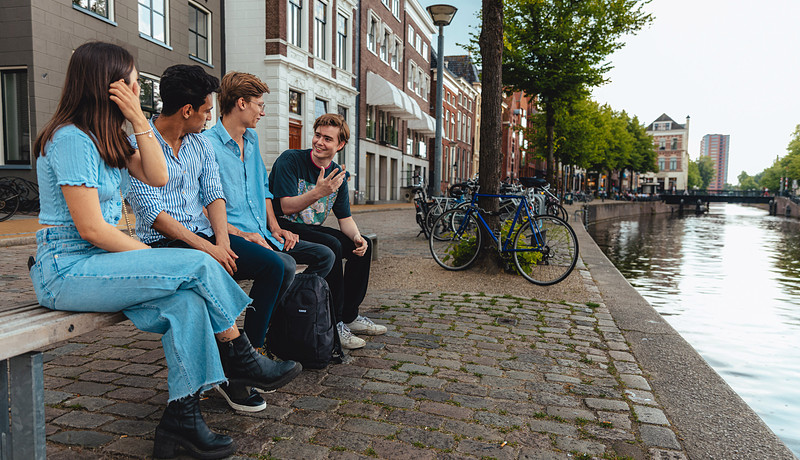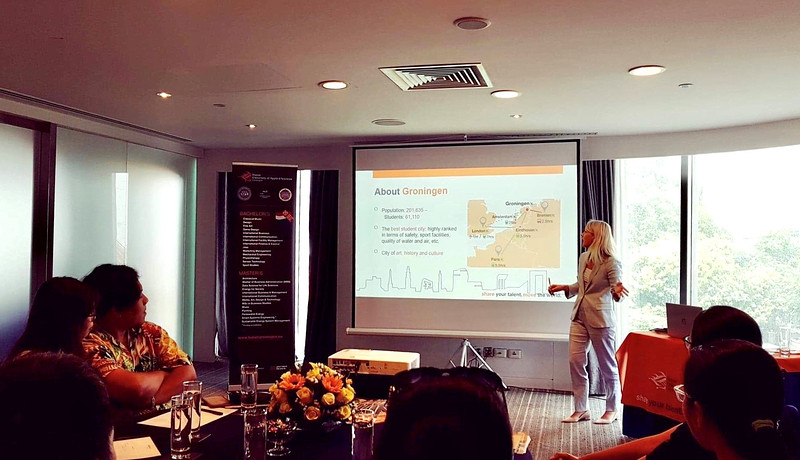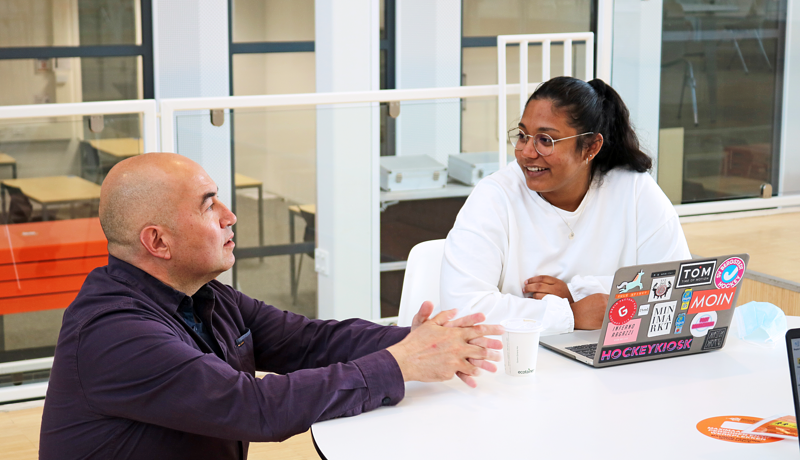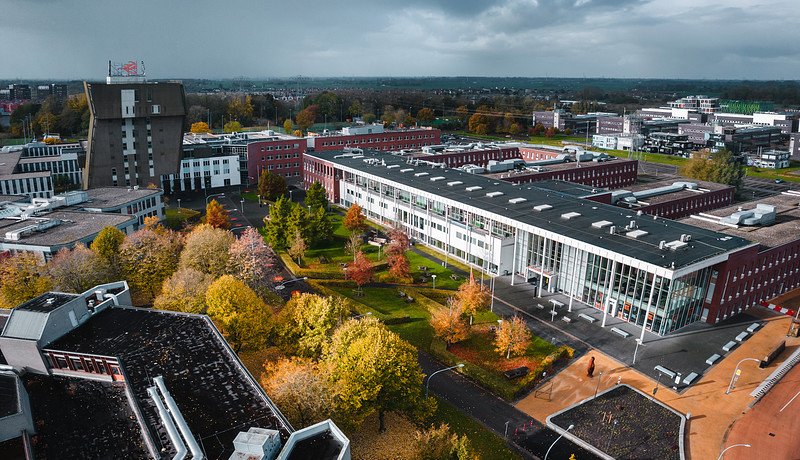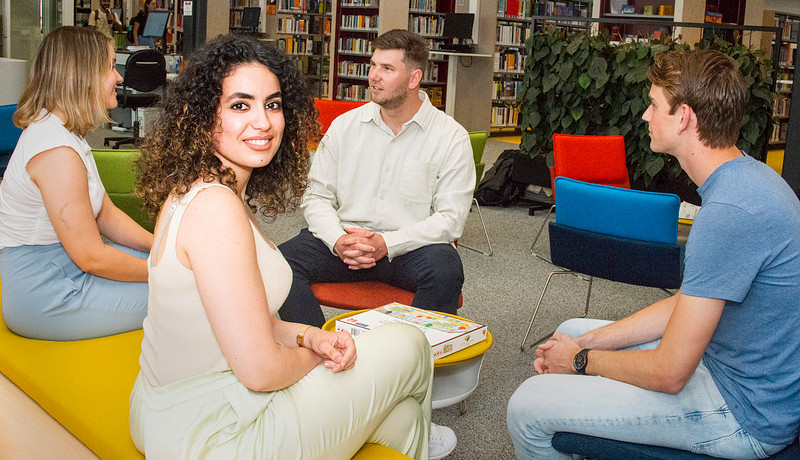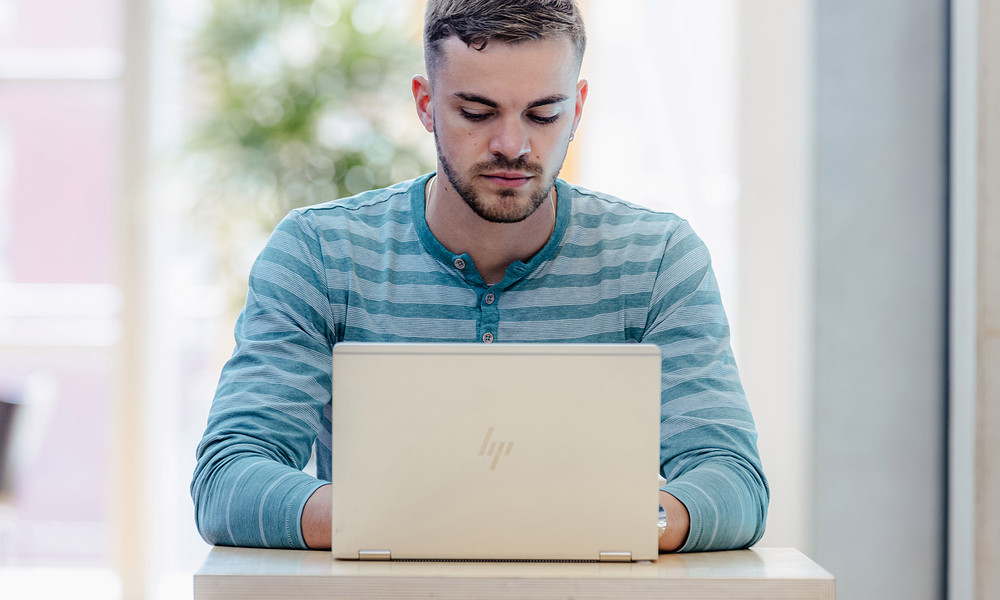
We understand that choosing the most suitable university can be challenging for your child and they might need some guidance and support. Therefore, we prepared this page specifically for parents, to showcase our university as well as the surroundings, and to let you know how we can support your child in their decision-making process.
Get to know Hanze UAS
One of the most important things we try to do for new first-year students is to help them to feel at home. Hanze UAS and the city of Groningen offer various activities and associations which reinforce the sense of community and help new students to make friends and find their way in the city. We encourage students to get out of their comfort zone and join organisations or associations, so that they can develop their skills and meet new people. But what else you should know about Hanze UAS and living in Groningen that would help to ease your child’s journey?
You can find more information about Hanze UAS, Groningen, the Netherlands and the support we offer in the overview below.
Meet us!
You are more than welcome to accompany your child to an (online) Open Day, webinar, Campus Tour, or one of our other events!
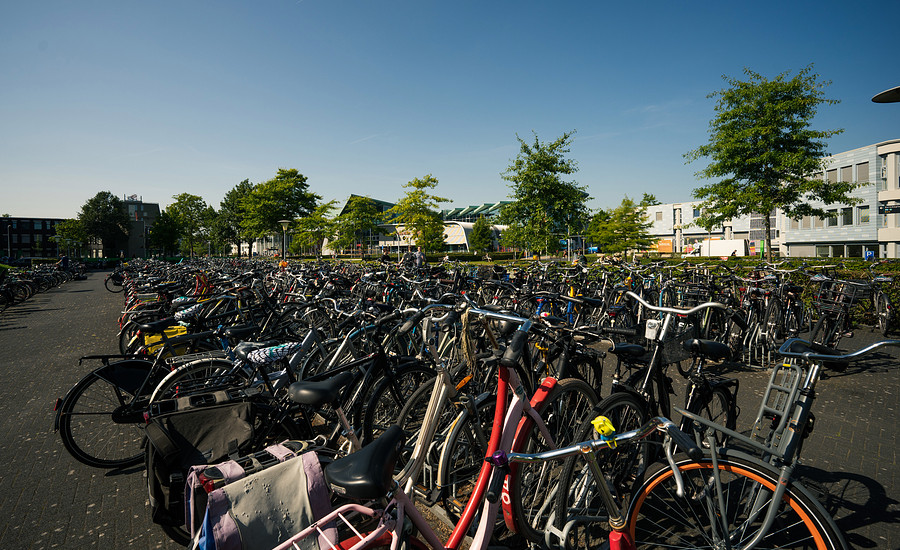
About studying at Hanze and living in Groningen, the Netherlands
Hanze University of Applied Sciences, Groningen (Hanze UAS), is the largest university of applied sciences in the Northern Netherlands. We were also the first university of applied sciences to found an International Business School in the Netherlands. Moreover, we are the only large higher education institution in the country with both an art academy and a conservatory of music.
At a university of applied sciences your child will not just learn theory, but also how to bring this into practice. Students often work in international project groups and work on innovative solutions for real clients. Often these projects focus on societal challenges and relate to, for example, sustainability, healthy ageing and digitalisation. Our motto is 'share your talent, move the world', meaning that we encourage and help our students not only to discover their full potential, but also to have a positive impact on the world we live in.
Most bachelor students will do an internship during their programme. The bachelor's programmes of Fine Art, Music and Sensor Technology do not have an internship semester, but they do have other facilities in place through which students gain work experience and practice their skills. By studying at Hanze, your child will learn valuable skills and build an international network of contacts that will help them find a job after graduation.
The internship generally takes place in the third year of the programme, or the second year in three-year programmes. Although students themselves are responsible for finding an internship, the programme provides support and maintains relationships with companies that hire students for internships. Students are trained in specific skills that can help them find a job or internship, such as guidance on how to write a CV, build a strong LinkedIn presence and how to ace a job interview.
Facilities on campus
We offer a top-notch, modern study environment on campus. In addition, we offer affordable student facilities to improve both body and mind for a balanced student life. This includes libraries, cafés and sport facilities, such as a swimming pool. We also have a General Practitioner (doctor) on campus where students can go should they have any health issues.
There are four exam periods a year in which students either take traditional written exams or hand in reports and present their project work during presentations. Each block consists of approximately seven weeks of classes, followed by two weeks of exams. The regular study schedule of a Hanze student usually includes 10 – 16 hours of in-class lectures and training on a weekly basis. Outside of these hours, students are expected to work individually on course work, and to collaborate with their project group on their project assignments.
The first year kicks off at the end of August or beginning of September, with a Welcome Day for all new international students and an introduction week with the study programme. After that, classes will start. The academic year typically runs until the beginning of July. Throughout the year, there are multiple breaks, such as two weeks around Christmas, a week in October and a week in May. Click here for more information about the academic year. We recommend all students to arrive mid-August, so that they have enough time to get settled, prepare their study place, find their way around Groningen, and sort out administrative formalities in order to kick-start their studies from September onwards.
Study load
The study year is divided into four blocks of 15 ECTS each. In each year, therefore, a student can obtain 60 ECTS. 1 ECTS (European Credit) equals 28 hours of study. Knowing this, students can calculate the study load for their courses and have a good indication of how much studying goes into each course.
Passing the first year
For bachelor's programmes, generally, in the first year, students have to obtain a certain number of ECTS in order to be allowed to continue the programme. Though this number may deviate a bit among different courses, it is generally around 45 ECTS. Therefore, it is vital that students take their programme seriously and focus on obtaining as many credits as possible.
Each student gets at least two opportunities to pass each exam or assignment. Generally, when putting in the required effort, students should not encounter any trouble meeting the ECTS requirement for the first year.
Students from non-EU/EEA countries also need to obtain at least 30 ECTS per year in order to fulfil the requirements of their student visa.
Studying abroad is a huge step for any individual, and we can imagine that at times, your child may be in need of some support. At Hanze, we have a support system in place:
- Every student is appointed an academic counsellor, who is their main contact person within Hanze UAS. The academic counsellor can advise your child on study-related matters as well as personal issues, and can refer them to additional support if needed.
- For more serious issues, your child can contact Hanze Student Support, which has a team of student counsellors and student psychologists available for support and consultation. Students can apply for a meeting with a counsellor or psychologist, or they can join one of the courses offered. For example, there are courses on how to study effectively or how to deal with anxiety. Hanze Student Support can also help students apply for extra study and financial facilities.
As a parent or guardian, you are in a great position to help your child figure out which study programme would suit them best. Here are some things to consider while helping them.
Fields of interest
Our programmes are divided into subject areas or 'fields of interest'. It may help if you first identify which field of interest appeals most to your child, before deciding on a degree programme.
(Online) events
You are more than welcome to accompany your child to an (online) Open Day, or one of our other events. Throughout the year we participate in international education fairs and events across the globe; click here for an overview of events. You can meet us in your home country to learn more about our study programmes and studying at Hanze UAS.
Campus Tour
Would you like to visit Hanze UAS with your child? That is also possible! Our Hanze International Student Team would be happy to show you around our campus and tell you all about studying at Hanze UAS and living in Groningen. Click here to book a campus tour.
Hanze Study Choice Support
Our Hanze Study Choice Support team is a dedicated team that aims to help you and your child choose the study programme that would suit them best. Your child can apply for a consultation meeting or join one of the informational events, and you are more than welcome to join them. The team also organises designated sessions for parents. Click here for more information about Hanze Study Choice Support.
The Netherlands - multicultural, safe and happy
The Netherlands is a multicultural country, which is well-positioned in Europe, making it easier to travel and reach all major European cities. The Dutch are known for their good command of English. The Netherlands is even ranked first worldwide in terms of speaking English as a second language (EF Proficiency Index, 2022). So do not worry if your child does not speak Dutch, almost 95% of the Dutch population speaks English!
The Netherlands is regarded as one of the safest and happiest countries in the world, which strongly values a good work-life balance. Therefore, there are no classes in the weekend.
The Dutch educational system is acknowledged worldwide for being of high quality. There are two types of universities in the Netherlands: research universities and universities of applied sciences. While research universities focus on the traditional, academic approach to learning, universities of applied sciences, such as Hanze UAS, employ a more career-oriented, interactive and student-centred teaching style.
Groningen - a true student city
A great study abroad experience is not only determined by having a good time at university. Living in a great city is just as important, considering the amount of time a student will spend calling this place their home.
Situated in the north of the Netherlands, Groningen is a young and vibrant student city, with half of its citizens under the age of 35. Groningen has a population of over 200,000 and boasts a picturesque and safe city centre, surrounded by relaxing countryside. The map of the inner city of Groningen dates from the early Middle Ages and many old buildings in the centre still show Groningen's great history.
The city of Groningen is known as the best student city of the Netherlands. That is not just because of its abundance of facilities for students and student organisations, but also because of the large number of bars, restaurants, sports facilities and cultural offerings. The city is known for having the cleanest air of all large Dutch cities. The water quality is also great – you can drink water directly from the tap. Besides being a student city, Groningen is also strong in the areas of research, innovation and entrepreneurship: a real city of talent. The public transport system is excellent – though the bicycle is the preferred mode of transport among students, those who do not feel comfortable riding a bike can commute easily to any part of the city by bus.
Do you want to know more about Groningen? Then check out this page.
We can imagine that having your child move abroad can seem overwhelming. Follow the link to our immigration pages for a clear overview of exactly what needs to be arranged before moving abroad.
Housing
In the Netherlands, universities usually do not provide student accommodation; there is no dormitory on campus. Students are responsible for finding accommodation themselves, but Hanze UAS does have a housing officer who can provide support and guidance. Click here to find more information about housing.
Cost of living
Students usually pay between €350 and €700 a month for accommodation, depending on whether they opt for shared or private facilities. The total costs of living per month hugely depend on the student's spending habits. There are also opportunities for students to find a side-job, to further support themselves financially. Click here to find more information about the cost of living and here to find out more about student job prospects in the Netherlands.
Feedback component
How satisfied are you with the information on this page?
Give your opinion
Thanks for your feedback. We will do something with it.
